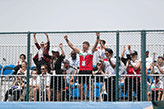Notes From the Sidelines — How to Be a Better Sports Parent

Parents of budding athletes often face troubles an average mom or dad don’t experience during parenthood. This is because promising athletes, especially young ones, require time and a specific type of attention and support from their parents to reach their goals. Because of the added pressure they feel when participating in a sport, these kids may experience more anxiety than their peers.
That said, helping your child become a great athlete entails a lot more than enrolling them in the best sports training available. You have to be fully invested in their development to reduce the weight they carry while trying to become the best in their sport.
What to Expect When Raising a Young Athlete
Raising a young athlete is no piece of cake, especially if you’re a rookie sports parent. You may have no idea about the world you’re entering into, in which case here are several things you should expect from your child as well as the things you should do to support them.
Child athletes need a unique parenting approach
Athletic endeavors are additional tasks your child needs to accomplish periodically, so you may need to pay extra attention and do things differently with them.
For instance, if you’re a parent who typically takes a wait-and-see approach to minor injuries, it is important to consider that even the smallest ones — can get worse when the youngster is training for a sport. It, therefore, may be necessary to change your approach in this regard.
Academics may suffer if not adjusted
Most of the time, sports can eat up most of a student’s time and energy, which is why it is not uncommon for children to fall behind in their academic performance when engaging in high performance athletic activities.
If your child is really motivated to pursue a sport, you may need to adjust his schedule to accommodate it. You might even need to reconsider how your child’s school format and setup fits in his or her regular training, rather than the other way around.
Private tutors, online education or homeschooling are all tool used by sport parents to ensure that their child maintains an academic education while also being able to pursue their sport dreams.
They still face typical day-to-day challenges
While they require special attention because of the added pressure from the sports they are engaging in, young athletes will still face the same day-to-day challenges their non-athletic peers are experiencing.
For example, a teenage tennis player will still need your guidance when faced with the quirks of puberty, especially since he or she will feel additional stress from the sport. They may also become frustrated with how the changes in their body impact their sports performance. Your role is to walk them through the process of sorting their emotions, processing the changes, and sharing your thoughts to help them get through it.
4 Tips on Raising Young Athletes
Below are four simple tips you can try to get you started on this challenging — yet wonderful — journey:
1. Don’t forgo family meals
Family meals are considered the best way to solidify a child’s connection to his or her parents. In fact, a study from a nonprofit organization linked to Harvard University showed that children who eat meals with their family engaged less in substance abuse and face less risk of obesity, depression, and teen pregnancy. They also tend to be more successful in their endeavors, be it in academics or sports.
2. Manage time wisely
Time is precious when you have a young athlete in the family. That said, it is imperative that you reduce your child’s screen time to help boost his or her chances at succeeding. Ideally, children aged between five and 12 years old should have no more than 2.5 hours, but a kid with a busy schedule may need this restricted further.
3. Know when your child is burned out
Considering that they engage in more activities than many of their classmates, kids who engage in sports have a higher risk of getting burned out. That said, it is your job as a sports parent to determine whether your child is starting to manifest signs of this condition.
One thing you should watch out for is a sudden change in behavior. If your child uncharacteristically exhibits unpleasant body language or overreacts often when going to practice, he or she may already be burned out.
Other signs you should look out for include:
- sudden disinterest in the sport
- declining performance
- detachment from the team and refusal to practice
- faking injuries
4. Give them household responsibilities
Even child athletes need to be treated like everybody else, especially at home. Assigning children chores gives them a better shot at success in life. This is a fact that has been supported by a Harvard study involving a look at the background of more than 700 high achievers.
Raising young athletes is a daunting task, but it is also very fulfilling if you fully understand what your child is getting into. This entails more than giving them the best coaching possible, it also means understanding the uniqueness of their situation, and knowing how you can adjust to guide them best through tough and trying times.
Recent Posts

Abu Dhabi Entertainment Company Hosts UAE Special Olympics Bowling Event

ABU DHABI ENTERTAINMENT COMPANY ACHIEVES 2 MILESTONES AT SPORT INDUSTRY AWARDS

Sanad Oasis Flag Football Cup

ADEC x Mubadala National Champions Sponsorship

